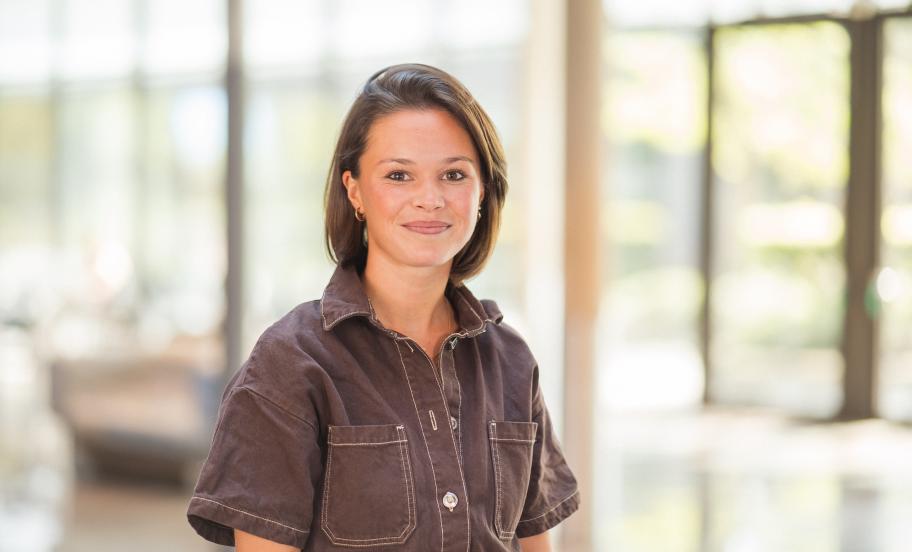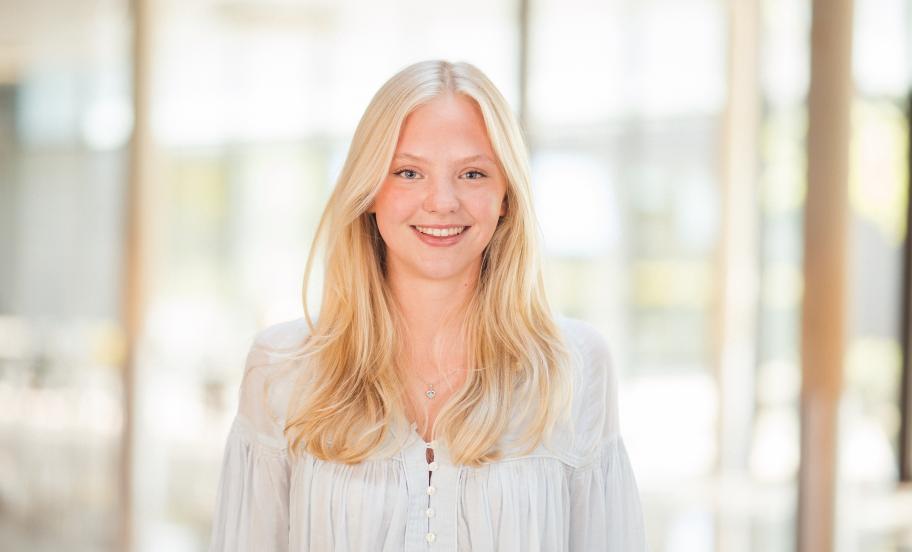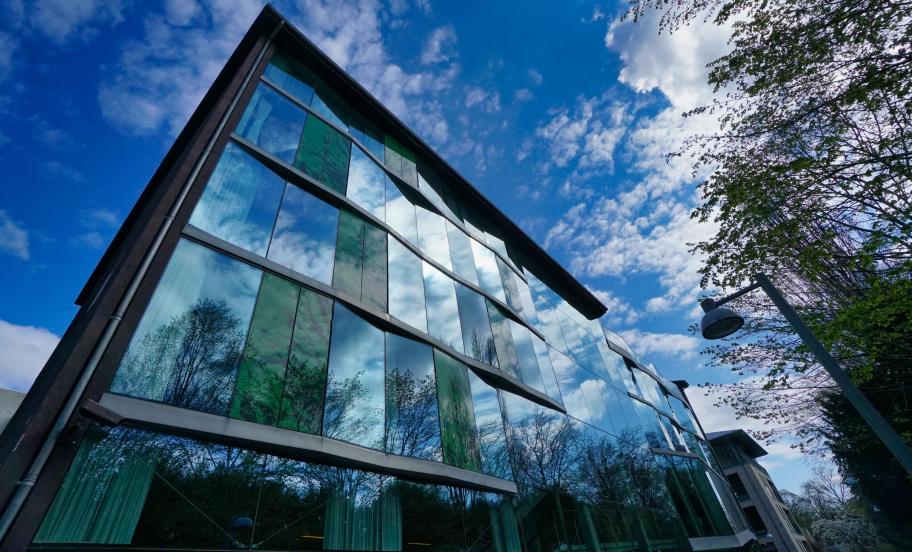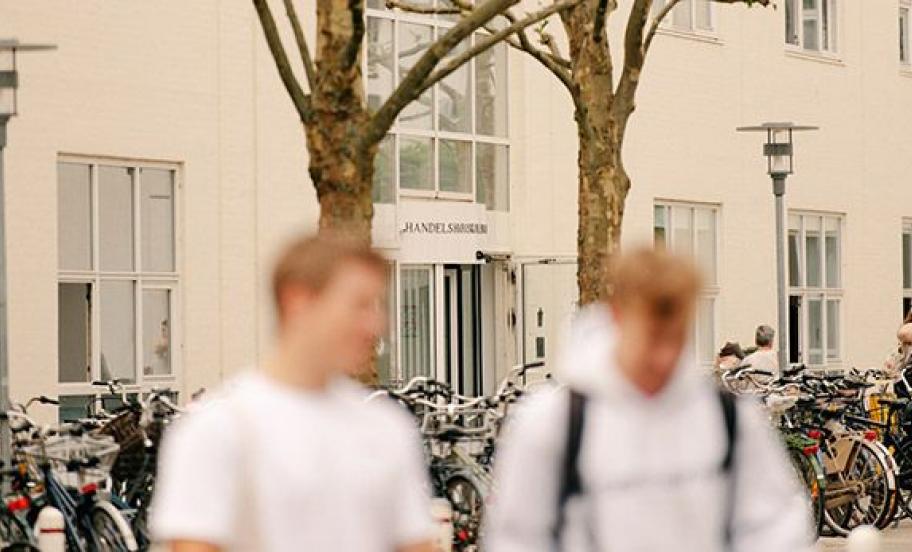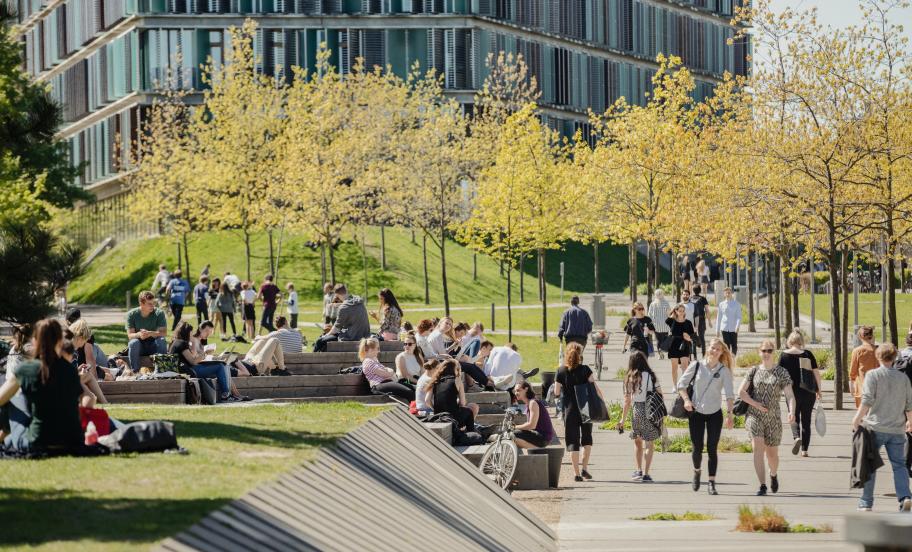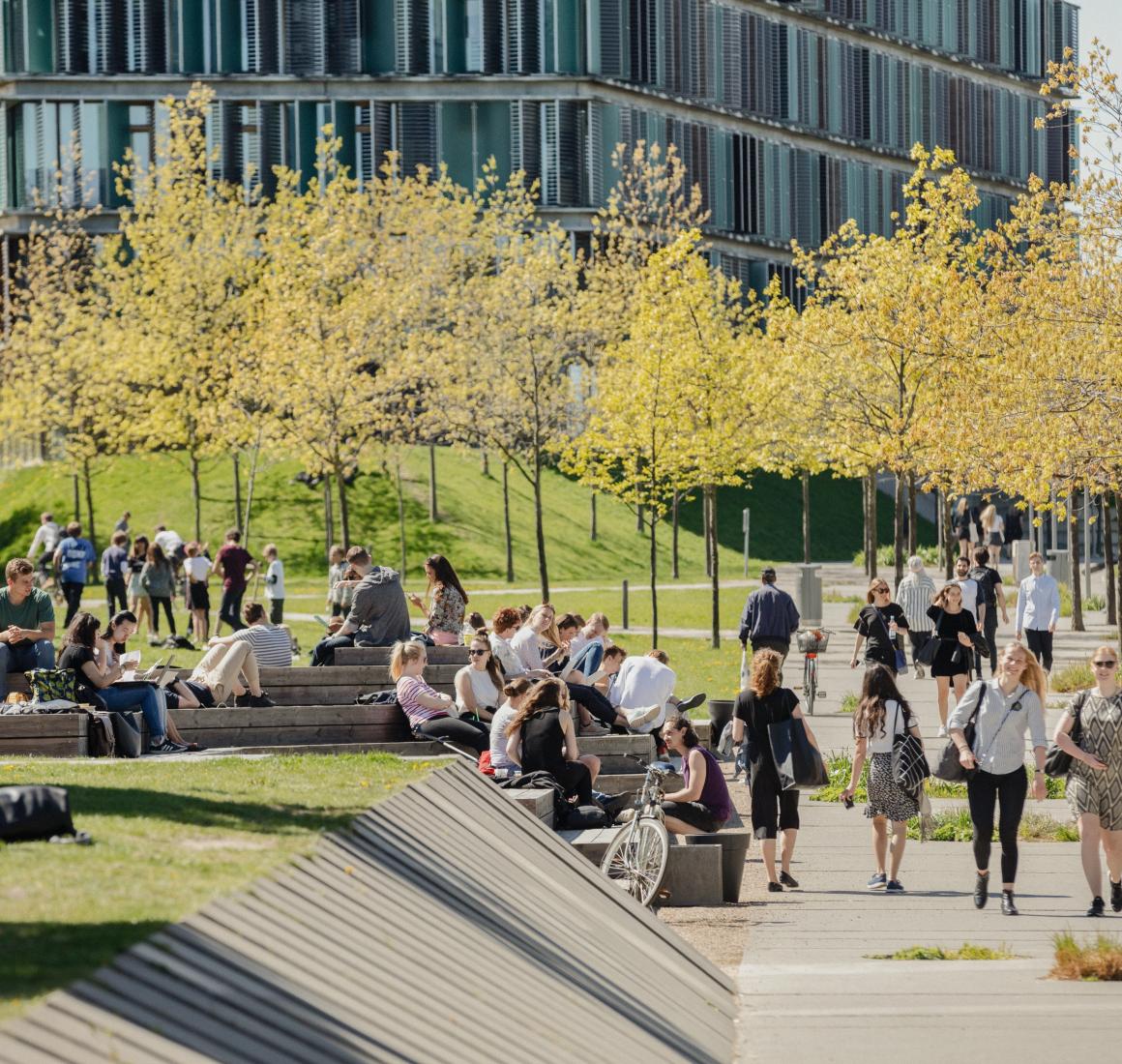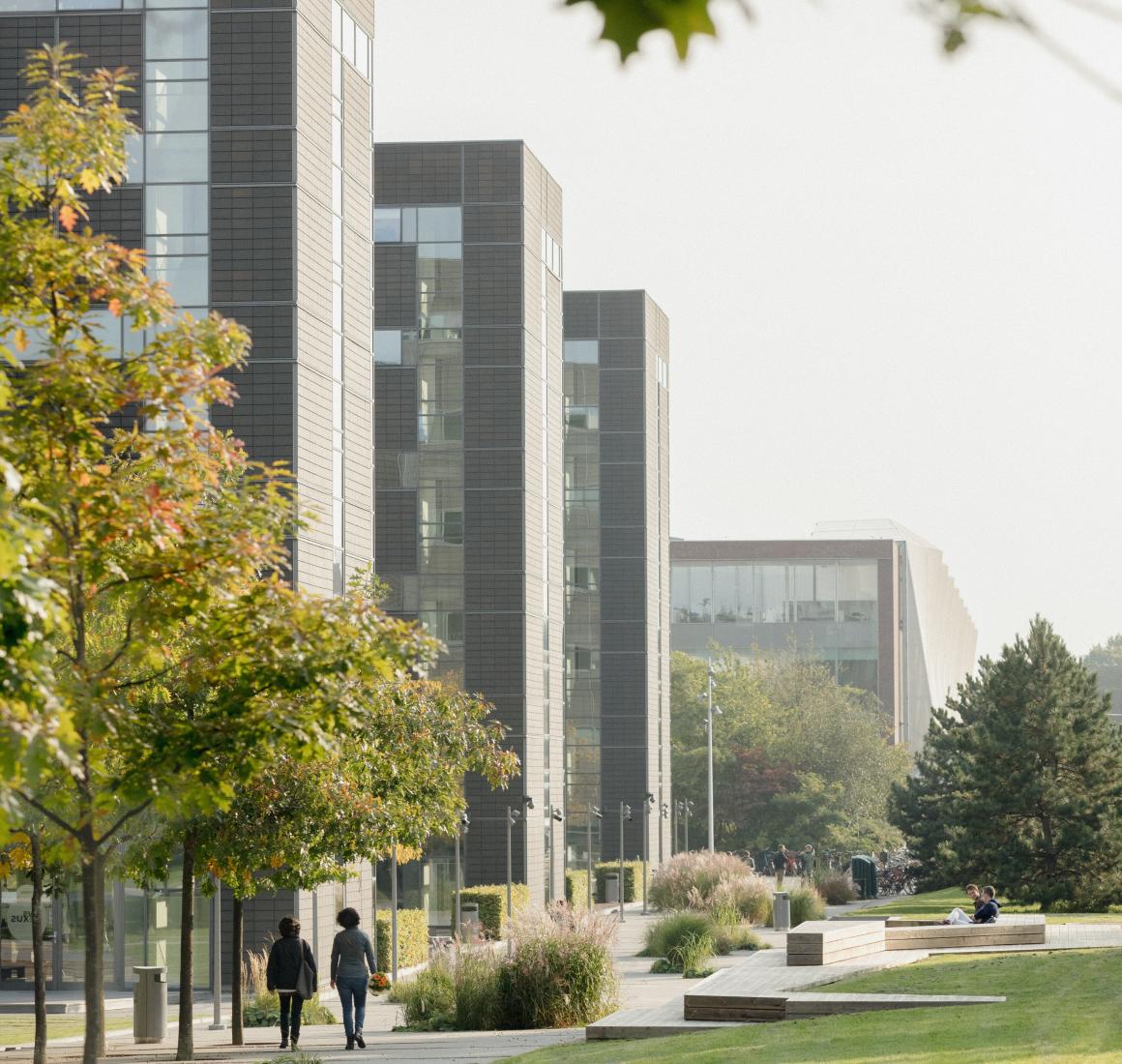BSc in Business Administration and Service Management
BSc SEM combines business economics and service sector studies and gives you an in-depth understanding of how to market, sell and organise a service in national as well as international markets.

About BSc in Business Administration and Service Management
Why choose BSc SEM
HEAR ABOUT THE PROGRAMME
Our student guidance counsellor gives you an insight into what BSc SEM is all about and what you will learn during the programme.
Services are everywhere
Think about your everyday life. You might listen to music or watch films online, use your mobile plan, take public transport, book a holiday, or visit a museum. All of these are services — and together they make up around 70% of Denmark’s economy.
Services as a competitive advantage
A service is something you buy without carrying home a physical product. It is an experience, a solution, or an extra layer of value. Take an electric bike: the bike itself is a product, but what makes the company stand out might be the service package — a mobile app to track routes, 24/7 support, free annual check-ups, or an extended warranty. Services like these do not just add value — they are often what makes the difference in a competitive market.
Turn services into strategy
On BSc SEM, you learn how businesses use services to create value and stand out in a competitive market. You explore how services work both on their own and as part of a broader customer experience.
From products to services
Companies compete just as much on service as on product quality. Good service – whether it is a part of a physical product or a stand-alone offering – is key to attracting and keeping customers. Sometimes, a great service can even matter more than the product itself. You will learn how businesses develop services that meet customer needs, deliver good costumer experiences and build loyalty. You explore how companies design, deliver and improve services – and how service can be a competitive advantage in any industry.
STUDENTS SHARE THEIR INSIGHTS
Simon, Sille and Sofie talk about their experiences with BSc SEM
Understanding business
To develop and improve services, you need more than a good idea – you need to understand the business as a whole. That is why you learn how companies make strategic decisions, so you know how to position a service offer to stand out from the competition. You gain marketing knowledge that helps you understand what customers actually value – and how to communicate it clearly.
You also learn how companies price their services in a way that is attractive to customers and sustainable for the business. And you gain insight into how organisations are structured, how they operate day to day, and how services are integrated into everything from logistics and operations to customer experience.
Build your toolbox
In addition, you build an analytical toolbox – learning both qualitative and quantitative methods to gather and work with data. These tools help you understand customer needs, test ideas, and make informed decisions about how to improve services.
Connecting the dots
You learn to connect the dots – between customer expectations, company goals, and the broader business environment. Because even the best service idea will not succeed unless it fits with the company’s strategy, is financially sustainable, and can be delivered efficiently. That is why a general understanding of business administration is important to creating services that truly add value – for both the customer and the company.
Come to Open Days
Visit us for Open Day and learn more about which programmes might be the right fit for you. You can also meet our students and talk to our staff.
We look forward to seeing you!

Structure
Economics and mathematics
You study how services create value in modern economies and why they are central to both private companies and public organisations. You work with economics at the firm level as well as at a national and international level, learning how markets and pricing shape economic decisions in the service sector.
Organisation and management
You explore how service organisations are structured and how teams and functions work together to deliver and manage services. You learn how management makes strategic decisions and how communication, coordination and teamwork contribute to effective service delivery and organisational performance.
Culture and society
You study how services influence everyday life, from transport to public institutions. You get a solid understanding of what people expect from services and how culture shapes their needs. You also learn how public regulations, cultural norms and societal values influence how organisations operate and make decisions.
Innovation and entrepreneurship
You learn how new services are designed, developed and improved based on customer needs. You work with testing and refining service ideas using data and feedback. The focus is on identifying opportunities and developing service solutions that create value for organisations and their users
Choose a specialisation within the service sector
Culture and Tourism
Tourism is one of the largest service sectors, and the creative industries are likewise a fast-growing international industry. There are many important intersections between the service sector and creative industries like the growing importance of cultural tourism where festivals, heritage, museums and concerts are important tourism magnets. The cultural sector is a special sector, where public subsidies are dominating, and the management of creative workers requires special skills and competences.Tourism businesses need sustainable practices and this specialisation focuses on tourism management to care for wellbeing, environments and cultures while still being innovative and competitive.
In this profile you will learn about the economics of these sectors, demand, management, socio-cultural dimensions, sustainability and entrepreneurship.
Managing Digital Services
Over 70 % of global value is created in the service industries. An increasing part of this value relates to digital services, directly or indirectly. The shift in the economy, both globally and locally, calls for a greater understanding of what it means to manage this, as it increases the intangible element inherent in many services. This ranges from purely digital services such as social media platforms, web-based services, online trade and financial services, online gaming and streaming services to the digital backbone of services such as transportation and production. The recent growth in AI will also be addressed by looking beyond the hype at the real potential it carries and the challenges it brings.
In this profile, you will learn about the logic and economics of digital services, demand, management, sustainability and entrepreneurship.
Service Innovation
Businesses today operate in increasingly competitive environments that favor change, novelty and social care as sources of value. You will be introduced to foundations of innovation theory, such as technology development, organisations, markets and consumers. It will provide you with skills necessary for exploring and experimenting with opportunities to use special characteristics of services become sources for innovation. Through a mix of theoretical and practical knowledge, you will be able to recognise, discuss and reflect on the management and practice of innovation of services.
In this profile, you will learn about the economics and practice of innovation from a service industry perspective emphasizing sustainability and entrepreneurship.
Programme overview
Choose a specialisation below to see the programme overview:
Culture and Tourism (Panel content)
1st semester
2nd semester
3rd semester
4th semester
5th semester
6th semester
Managing Digital Services (Panel content)
1st semester
2nd semester
3rd semester
4th semester
5th semester
6th semester
Service Innovation (Panel content)
1st semester
2nd semester
3rd semester
4th semester
5th semester
6th semester
Options during the programme
Electives
On the 5th semester, you can choose to select courses that support your specific interest. CBS offers a large number of electives within a wide range of topics. You can also choose to take electives at other Danish universities. The electives you choose have to be relevant for your programme.
See the current selection of CBS electives on courses at bachelor level.
Exchange
Many students choose to go on exchange on their 5th semester; usually at one of CBS’ more than 300 partner universities. When you go on exchange through CBS, you do not have to pay for the teaching at the foreign university (with a few exceptions), and you can bring your SU (student grant).
Find a list of all CBS partner universities here.
Internship
You can substitute some of your electives with a so-called academic internship. The academic internship consists of a working period in a company which is completed with a project report. The internship can take place either in or outside of Denmark.
An academic internship gives you the opportunity to reflect on and apply the theory that you have learn at CBS to real cases. Your assignments during the internship and the subject of the project report must therefore be relevant to the programme you are studying.
Come to Open Days
Visit us for Open Day and learn more about which programmes might be the right fit for you. You can also meet our students and talk to our staff.
We look forward to seeing you!

Study environment
Social study environment
You will begin the programme alongside 100 other students and quickly get to know many of them through your exercise class and group work. Students are social and often spend time together on campus—studying in the library or hanging out between classes.
Active student organisation
The student union SEM Society organises social events at the beginning and end of each semester for all SEM-students. It is a great way to meet your fellow students across exercise classes and cohorts and build connections outside of lectures.
An international environment
Students come from both Denmark and abroad. This means you will be speaking English in both academic and social settings. It might feel a bit awkward at first, but it quickly becomes second nature as English becomes part of your everyday life.
As an international student, you might feel a bit lonely at first. However, the more time you spend getting to know your fellow students, the quicker you will build a strong network in Copenhagen. Luckily, SEM students are great at organising social events you can join.
Read more about Student life on CBS.
WHAT DO THEY THINK?
Learn how Simon, Sille and Sofie experience their student life on BSc SEM
Meet the students
Teaching and exams
Teaching activities
You will have lectures with your whole year and smaller exercise classes. In the lectures, you are introduced to the theories and models you need to learn. In the exercise classes, you will work more hands-on with solving assignments and applying what you have learned on a case study.
Group work
In some of your mandatory courses, you will work on projects with a study group. During your first semester, you will be assigned to a group, but after that, you can choose your own group members.
Read more about teaching and working methods.
Exams
You will encounter different types of exams, such as written sit-in exams, larger projects, and oral exams. Most of your exams are individual, but some exams you have to submit your exam project together with your study group.
Read more about exams at CBS.
Time consumption
Workload
Pursuing a bachelor degree is demanding, and the curriculum and workload are much greater than what you experienced in your upper secondary education. So, you should expect spending approximately 37 hours on average on your studies each week.
Busy periods
The workload will vary during the year. The time leading up to assignment submissions and exams can be hectic, and you can easily work more than 40 hours a week in this period. Preparing for oral exams can be especially time consuming, because you have to be able to explain and discuss the covered concepts and theories and learn things by heart.
Read more about teaching and working methods
Student job
Most programmes are quite flexible in terms of combining studies with a student job. Most students work a maximum of 15 hours a week in order to have sufficient time for their studies.
Studying in Denmark - for internationals
If this is your first time studying in Denmark, you may find teaching and exam formats, the grading scale and the academic calendar very different from what you are used to.
Read about everything you need to know as an international student studying at CBS at Internationals students
Come to Open Days
Visit us for Open Day and learn more about which programmes might be the right fit for you. You can also meet our students and talk to our staff.
We look forward to seeing you!

Entry requirements
Language requirement: A
Admission in numbers
Challenges and considerations
What you should consider
Our student guidance counsellor talks about the challenges on BSc SEM and what you should consider before applying.
Academic challenges
Working academically
Some students think BSc SEM is very hands-on and focused on specific service industries. While you will learn about real companies – it is important to know that this is an academic university programme.
You will be introduced to broad theories in business administration and be expected to work analytically and think critically. This means reading theory, writing academic texts and applying models to real-world cases. You need to be comfortable with this theoretical and analytical approach to studying.
Studying in English
If you are not used to studying in English or if you are not a native speaker, we recommend that you read more about what to consider before applying for an English-taught programme.
Read more here.
Math as a tool
In about half of the mandatory courses in BSc SEM you will use maths as a tool. You will not use maths that is complicated beyond the entry requirement for the programme, but you need to be comfortable having courses where you use maths and do calculations at a practical level.
WHY THEY CHOSE BSC SEM?
Hear what Sille, Sofie and Simon considered before applying for BSc SEM
In need of special support?
Do you have a disability such as dyslexia, anxiety, autism, ADHD, long-term effects of concussion or another physical, psychological or neurological disability?
Then you have the opportunity to apply for Special Educational Support (SPS) and special conditions while studying.
This ensures you can study on equal terms with your fellow students.
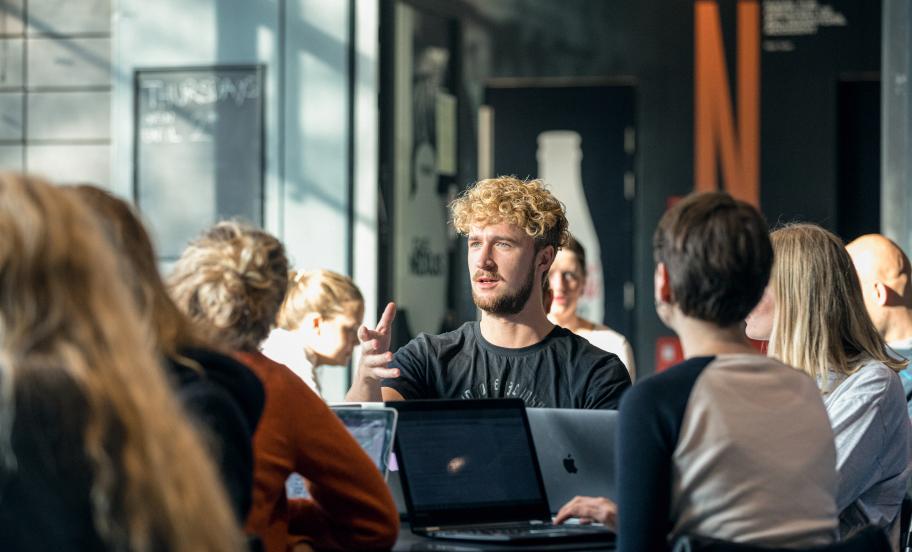
Apply for admission
Info meeting about admission
Join an info meeting about admission where we guide you through the admission process and explain about Quota 1 and Quota 2, how to fulfil the entry and language requirements, and much more.
Come to Open Days
Visit us for Open Day and learn more about which programmes might be the right fit for you. You can also meet our students and talk to our staff.
We look forward to seeing you!

After the programme
Master's degree after BSc SEM
The majority of students from BSc SEM continue on to a two-year master programme, making it a total of 5 years of studies.
It is very much the master rather than the bachelor programme that shapes your future career opportunities.
After graduating from BSc SEM, you are guaranteed a place in the natural progression: MSc in Economics and Business Administration in General Management and Analytics
What you learn on BSc SEM
Career options after BSc SEM
A broad skill set opens many doors
Like other bachelor programmes, BSc SEM gives you a broad skill set that fits many different jobs and industries. Because of this, it is difficult to predict exactly where you will end up working or what your specific tasks will be.
Your journey shapes your career
As you study, you customise your academic profile through the choices you make and the experiences you gain — your personal interests, electives, exchange stays, internships, and student jobs. That means your journey — and your future career — may look very different from your classmates’
Specialise with a master programme
The majority of students choose to continue on to a two-year master programme. Here you specialise further, which opens up new career options and paths.
A changing job market
The job market is always changing — new roles appear, and existing ones change — so the path is not always clear from the start. You will continue to develop and learn new skills, making it possible to change direction and seize new opportunities throughout your working life.
YOUR OPTIONS AFTER BSC SEM
Our student guidance counsellor talks about what options you have after graduating from BSc SEM
Job and task examples
Most BSc SEM graduates go straight into a master programme after finishing their bachelor. Later, they typically work in a range of industries or departments, such as
- Marketing and brand management
- Customer experience and service design
- Sales and business development
- Consulting and strategy
- Digital services and e-commerce
- Innovation and product development
Tasks can vary a lot, but specific examples are:
- Create campaigns and strategies that make customers aware of a product or service – and choose it over the competition.
- Plan and improve how customers experience a service – from first contact to follow-up – to make it smooth, helpful, and enjoyable.
- Find new customers, build strong relationships, and help grow the business by identifying new opportunities and markets.
- Help companies solve problems and make smart decisions about their future direction, based on research and analysis.
- Work with online platforms, apps, or webshops to create and improve digital services – and ensure they are easy and appealing to use.
- Come up with and test new ideas for services or products – and help bring them to life in a way that fits the company’s goals.
Come to Open Days
Visit us for Open Day and learn more about which programmes might be the right fit for you. You can also meet our students and talk to our staff.
We look forward to seeing you!

More about BSc in Business Administration and Service Management
BSc SEM combines business economics and service sector studies and gives you an in-depth understanding of how to market, sell and organise a service in national as well as international markets.
Related master programmes
Other bachelor programmes
Curious about similar study programmes? You may find other study programmes that also match your interests and dreams for your career.
